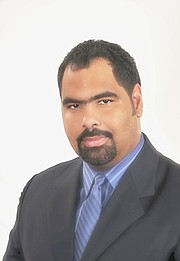By TANYA SMITH-CARTWRIGHT
tsmith-cartwright@tribunemedia.net
GOWON Bowe, Group CEO for Fidelity Bank & Trust, has said he is not moved by the 2021 Manifesto and Blueprint for Change released by the two major political parties as they gear up for the next election, but instead wishes they would carry out the policies of the National Development Plan initiated in 2016.
He said any party promising a quick turnaround of the country’s situation is creating an unrealistic expectation.
Mr Bowe spoke with The Tribune days after both the Free National Movement and the Progressive Liberal Party presented their manifesto and blueprint to the public.
Mr Bowe said he wishes each administration would stick to a national plan and complete the work started by the previous government.
“Let’s start from the very foundation that as a citizen or anyone assessing the manifesto and the blueprint is firstly asking whether these are political cycle documents or long-term documents for the development of the country. The reason why I say that is we have seen what the results of five-year promises have provided for us.
“It is really one, a consistent practice of retardation because every time there’s a change in administration there seems to be an abandonment of the policies good or bad of the previous administration. So we not only start from scratch, but we tend to go backward because we end up, if you will, abandoning useful analysis, research and policy documents that have come about.
“Putting that into context, I think all of the documents need to be assessed in the context of the National Development Plan which commenced in 2016 under a different administration, but was an apolitical exercise because it was to incorporate all political parties, not just government of the day.”
Mr Bowe went on to describe the danger of promising quick restoration to the country’s situation and outlined how long it would actually take to turn things around.
“The truth of the matter is that anybody who is promising that there will be recovery, restitution and prosperity in the foreseeable future, meaning the next two years, is unfortunately, creating unrealistic expectations,” he said continuing. “It has taken us decades to get where we are in terms of our debt situation, in terms of our spending pattern, in terms of our mindset. So reversing that is not going to be over a single administration.
“It is important to have an administration who’s not looking at the next five years, but looking at how we start to reverse the course that we are on and set in place policies, initiatives, plans and infrastructure—both in terms of personnel and in terms of assets—on making the country what it used to be.
“That, to me, is going to take several years. . .We’ve had multiple changes in administration since 2002 and each time that has led to us going back. None of the political parties seem to appreciate that governments are continuous.”
He said the electorate, at a time like this, should question the reality of carrying out election promises.
“While some may call it sinister, to be honest those documents aren’t the elements that move me as an individual,” he noted. “What will move me is who is endorsing the National Development Plan initiatives through to its completion; who is saying that we will have a strategy for the country that is 25 to 30 years long and who is then telling me that they are best placed to actually carry out execution. And, not by just talk.
“The electorate needs to step back and say, ‘How much of what is being presented is substantive?’ That’s not to be overly critical to say that any paraphernalia can set it all out, but you want to hear in the discussions like rallies or forums that they are articulating how they are aligning to a long term plan … not just something that will be designed to peak your emotions.
“Any political document is only as good as the underpinning analysis and empirical evidence that supports it. All of that can’t be articulated in a document or on a campaign trail. There needs to be the confidence that the initiatives, promises, commitments are underpinned by analysis, empirical evidence, considered thought, but more importantly the advancement of the country over the next 25 to 30 years, not the next five years of an administration.”
Mr Bowe said the National Development Plan has four pillars – economic, social, environment and governance.
“When we look at the four pillars, most of what has been thrown out to the general public are those that are designed or intended to be emotive responses,” he continued. “Things about minimum wage. Things about what social benefits are going to be provided. The very cloud nine elements on economic growth and expansion.
“The reality is that governance requires a mindset change because it requires us to now look at meritocracy. It requires us to look at how do we assess performance by the policy makers and the public servants in terms of their productivity, advancement and upskilling and professionalism?”





Comments
The_Oracle 4 years, 5 months ago
Manifesto has come to mean empty promises or things to fail at, or run from, so the PLP seizes upon another word, Blueprint, which will come to mean the same thing. Insanity that we keep electing the same old repeatedly, and with such passion and infinite Blindness.
ThisIsOurs 4 years, 5 months ago
Anyone who believes anything any of them says has to have their head examined.
I can predict what they're going to do immediately. 1. Take care of RCL and 2. Sebas. The rest of us be damned
Sign in to comment
OpenID